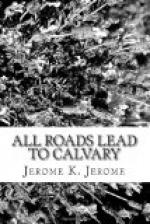Mary hoped that Joan was hungry. Joan laughed and admitted that she was. “It’s the smell of all the nice things,” she explained. Mary promised it should soon be ready, and went back to her corner.
A short, dark, thick-set man entered and stood looking round the room. The frame must once have been powerful, but now it was shrunken and emaciated. The shabby, threadbare clothes hung loosely from the stooping shoulders. Only the head seemed to have retained its vigour. The face, from which the long black hair was brushed straight back, was ghastly white. Out of it, deep set beneath great shaggy, overhanging brows, blazed the fierce, restless eyes of a fanatic. The huge, thin-lipped mouth seemed to have petrified itself into a savage snarl. He gave Joan the idea, as he stood there glaring round him, of a hunted beast at bay.
Miss Ensor, whose bump of reverence was undeveloped, greeted him cheerfully as Boanerges. Mr. Simson, more respectful, rose and offered his small, grimy hand. Mary took his hat and cloak away from him and closed the door behind him. She felt his hands, and put him into a chair close to the fire. And then she introduced him to Joan.
Joan started on hearing his name. It was one well known.
“The Cyril Baptiste?” she asked. She had often wondered what he might be like.
“The Cyril Baptiste,” he answered, in a low, even, passionate voice, that he flung at her almost like a blow. “The atheist, the gaol bird, the pariah, the blasphemer, the anti-Christ. I’ve hoofs instead of feet. Shall I take off my boots and show them to you? I tuck my tail inside my coat. You can’t see my horns. I’ve cut them off close to my head. That’s why I wear my hair long: to hide the stumps.”
Mary had been searching in the pockets of his cloak. She had found a paper bag. “You mustn’t get excited,” she said, laying her little work-worn hand upon his shoulder; “or you’ll bring on the bleeding.”
“Aye,” he answered, “I must be careful I don’t die on Christmas Day. It would make a fine text, that, for their sermons.”
He lapsed into silence: his almost transparent hands stretched out towards the fire.
Mr. Simson fidgeted. The quiet of the room, broken only by Mary’s ministering activities, evidently oppressed him.
“Paper going well, sir?” he asked. “I often read it myself.”
“It still sells,” answered the proprietor, and editor and publisher, and entire staff of The Rationalist.
“I like the articles you are writing on the History of Superstition. Quite illuminating,” remarked Mr. Simson.
“It’s many a year, I am afraid, to the final chapter,” thought their author.
“They afford much food for reflection,” thought Mr. Simson, “though I cannot myself go as far as you do in including Christianity under that heading.”
Mary frowned at him; but Mr. Simson, eager for argument or not noticing, blundered on:—




